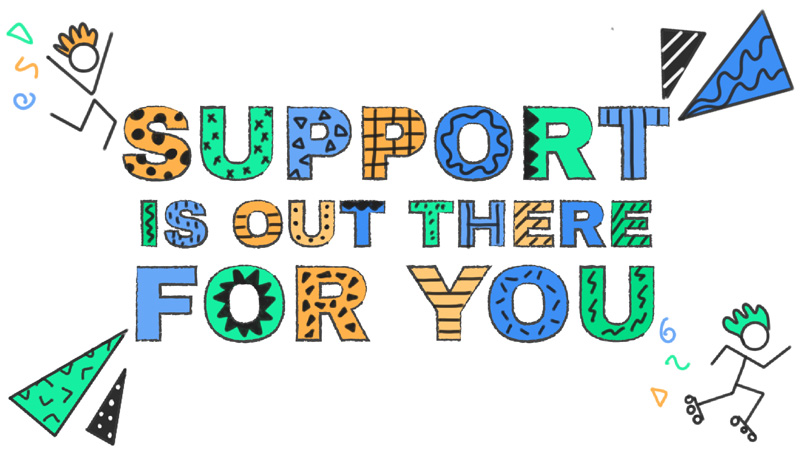
Support for young Londoners
Finding wellbeing and mental health support that understands what you are going through and will address your specific needs.
Finding wellbeing and mental health support that understands what you are going through and will address your specific needs.

Young Londoners have made huge sacrifices during the pandemic. If you need support, there are people who can help. You’re not alone. Find information and support.
Finding support for you
Here are some sources of support and some useful ways to get support if you are finding it hard.
Feeling anxious or stressed? Struggling to sleep? As you grow up, you experience physical changes and various pressures, such as exams and bullying, that might have an impact on your mental health.
Here we have collated a range of resources, videos and podcasts to help you to manage your wellbeing.
Online resources
- The Mix is the UK’s leading support service for young people. They are here to help you take on any challenge you’re facing – from mental health to money, from homelessness to finding a job, from break-ups to drugs.
- Good Thinking, London’s digital wellbeing service, has a range of resources and advice for young Londoners. They range from free apps, to blogs and they also have some great tips for keeping and staying mentally well.
- Join Kooth to receive, free, anonymous and safe mental wellbeing support. It doesn’t matter how big or small your concern is, the Kooth community is available to support you through it all.
- If you’re feeling anxious or stressed about financial difficulties, then explore the helpful range of resources and guidance on City Hall’s Help with the cost of living hub.
Video resources
- You can also hear from other young Londoners about what they’ve been doing to support their wellbeing.
- In a short video recorded especially for Thrive LDN, hear how UK Grime star, Laughta, supports her own mental health and wellbeing as well as watching two live performances from the rising star.
- Watch a video message from Amani Simpson, an award-winning social entrepreneur and youth leader. At the age of 21, he was stabbed 7 times after intervening in a robbery attempt. Since then, he has dedicated his life to empowering young people.
- Social media is an enjoyable part of everyday life for many people, but what you do online can have both benefits and risks to your mental health. This video from NIHR ARC West provides five top tips to support your mental health when using social media.
Podcasts
- The Act On podcast focuses on issues facing young Londoners’ lives, such as inequality, the challenges of social media and the positive impact of participating in live music and cultural activities. Recorded with young people, it opens up conversations around breaking down barriers, building resilience and the importance of having a sense of community.
- Navigating a relationship was difficult enough before but lockdown has added another level of complexity. Listen to a Good Thinking podcast with education and wellbeing specialist, Amber Newman-Clark from Brook, a nationwide charity supporting young people with sexual health and wellbeing advice, who talks about what has changed and offers some useful tips.
Other resources to help you
Dealing with difficult emotions can be challenging but help and support is available.
In London, there are a range of free resources, online tools, and helplines available to help you deal with the uncertainty and stay mentally healthy. You may also be interested in resources in the main section for other communities, which you may also be part of.
Digital resources available now
Good Thinking is a digital mental wellbeing service that has over 100 free, NHS-approved resources designed to help those dealing with anxiety, low mood, poor sleep or stress. Take the clinically validated self-assessment to get a better understand of what you’re going through, helpful resources and if necessary, relevant treatment options.
To help build resilience and maintain good mental wellbeing, Every Mind Matters has a range of resources for everyone at Including an interactive quiz, the Your Mind Plan, to get top tips and advice relevant for you.
NHS psychological treatments
If you do not require urgent support but are still concerned about your mental health, contacting your GP is a good place to start.
You can also refer yourself for free, non-urgent NHS talking therapy services, also known as Improving Access to Psychological Therapies services, which provide evidence-based treatments for depression and anxiety. In London, services are ready and open to receive self-referrals for those needing professional support.
Helplines
Or you may feel more comfortable talking to someone you don’t know by using one of the following helplines:
- If you, or anyone you know, is experiencing a mental health crisis and needs urgent assistance, advice or support, contact your local 24/7 NHS mental health helpline.
- Shout is the UK ‘s first 24/7 text messaging service for anyone in crisis. Text Shout at any time to 85258 to start a conversation.
- Samaritans’ free, 24-hour listening service on 116 123 or email jo@samaritans.org.